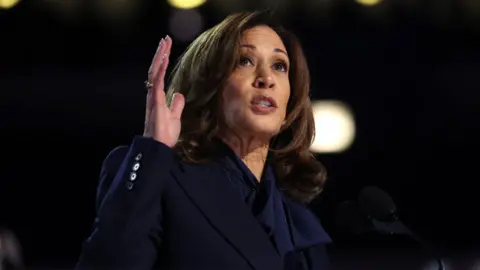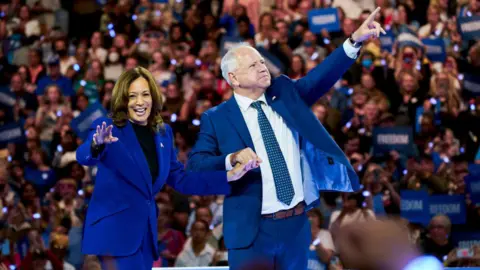 Getty Images
Getty ImagesThree weeks ago, just days after being formally chosen as the Democratic presidential nominee, Kamala Harris was pressed on her plans for a sit-down interview.
“I’ve talked to my team,” she told reporters on airport tarmac in Detroit. “I want us to get an interview scheduled before the end of the month.”
On Thursday night, Ms Harris will – just barely – make good on that promise, sitting down with CNN’s Dana Bash for her first major interview.
But Ms Harris will not be there by herself. The vice-president will be joined by her running mate, Minnesota Governor Tim Walz, for the prime-time appearance, airing at 21:00 EDT (02:00 BST).
The interview answers weeks of questions concerning where and when Ms Harris would conduct an in-depth, substantive discussion of her candidacy and agenda – standard procedure for all major party presidential candidates.
But with Mr Walz in tow, the appearance may also fuel growing criticism that after escaping the rigours of a months-long presidential primary, she is now dodging the scrutiny that comes with a solo interview.
Joint interviews featuring both members of a presidential ticket are not unusual.
Barack Obama and Joe Biden sat for an interview with 60 minutes after Mr Biden was selected as the vice-presidential nominee in 2008. Eight years later, Hillary Clinton and her running mate Tim Kaine did the same. For Ms Harris and Mr Biden in 2020, they picked ABC’s 20/20. And less than a week after Trump announced JD Vance as his running mate, the pair were jointly interviewed on Fox.
But since Joe Biden passed the torch to her late last month, Ms Harris has limited most of her engagement with the press to scripted and highly-controlled environments. Her last formal sit-down interview was on 24 June, more than two months and a political lifetime ago.
Her occasional interactions with reporters – brief answers to shouted questions on her way to and from campaign events – have done little to quell Republican claims that she is shirking any opportunity to have her record and agenda put under the microscope.
The harshest criticism comes from her opponents, Donald Trump and JD Vance, who have both given several interviews in the past month.
 Getty Images
Getty Images“She’s not smart enough to do a news conference,” Mr Trump told media earlier in August. “She won’t do interviews with friendly people because she can’t do better than Biden.”
Ms Harris’s apparent hesitation to sit down for questions has fuelled the Republican narrative that the Harris-Walz campaign lacks in substance.
“I think it’s incredibly weak, weak sauce, to show up with your running mate,” said Scott Jennings, a former special assistant to President George W Bush, on CNN this week, adding that Harris had a “troubling lack of confidence” in her own political ability.
The Democratic nominee has enjoyed a surge in momentum since entering the race. Now, after her whirlwind introduction to American voters, she needs to “reinforce” that energy, said Republican strategist and Trump critic Chip Felkel.
“She’s gotta get out there,” he said. “She’s got to show that she can think under pressure, because that’s part of what the president has to do.”
But supporters of Ms Harris insist that given the breakneck nature of her candidacy, she is taking things at a smart pace.
“I think the cadence has been right,” said Peter Giangreco, a Chicago-based Democratic strategist. “Win the nomination, pick your nominee, lay out your economic plan, do your convention and now do some sit-downs and amplify that.”
Mr Giangreco predicted Ms Harris and Mr Walz will focus on their economic plan, an agenda to lower the cost of living and provide economic security that she first announced at a rally in Raleigh, North Carolina two weeks ago.
With that particular message, the presence of Mr Walz during this week’s interview may prove useful. The Minnesota governor has earned praise from liberals for his economic record while in office, including hundreds of millions in tax credits to families, and universal free school lunches.
Mr Giangreco also pointed to another potential benefit of a joint interview: drawing a contrast between Mr Walz and his Republican counterpart Mr Vance.
Since Mr Vance joined Trump’s ticket in July, the Ohio senator has made repeated stumbles, forced to defend past comments, like his derision of “childless cat ladies”.
Still, the real impact of Ms Harris and Mr Walz’s sit-down won’t be known until it is done.
Ms Harris’s record with high-pressure interviews is mixed. A 2021 conversation with NBC’s Lester Holt, in which she fumbled through questions about her role in the administration’s border policy, was widely regarded as a failure.
But a more recent appearance, a one-on-one with CNN’s Anderson Cooper, in which she defended Mr Biden’s calamitous debate performance, Ms Harris looked calm and confident amid a political firestorm.
If this next CNN appearance is any comparison, most of the criticism will fall away, said Mr Felkel, the Republican strategist.
“They [the campaign] just need to be able to say ‘see, we told you,’” he said. “And then keep moving.”

Read More: Why is Kamala Harris bringing Tim Walz to her first major interview?


